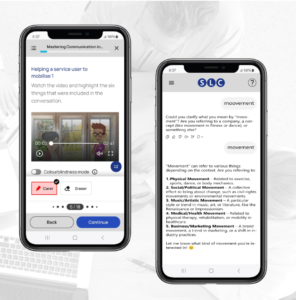
SLC win Ufi grant to develop AI language learning app for social carers
We’re delighted to have won a grant from Ufi VocTech Trust to develop an AI-driven technology solution that provides cheap phone-based language and communication skills

People often assume that the UK is a formal culture. Likewise, they imagine that British people use formal English when they speak.
These assumptions are both wrong. They’re based on a stereotype of the British as being stiff and upright. People think that the Brits say ‘how do you do?’ when meeting, and answer the phone with a phrase like ‘Mayfair 2579.’
I’ve also been told (by non-British people) that at four o’clock in the afternoon we all stop what we’re doing to drink tea. You might even have read a language book that tells you so. However, if such stereotypes were true once, they’re not any more. If you come to the UK, you’ll notice how informal the culture is.
Of course, if you’re using Medical English in a professional situation, you’ll use formal or neutral language to phrase your questions and advice. That’s especially true if you want to pass the OET exam. But don’t be surprised if your patients respond in a very informal way.
Informal English isn’t often taught, but it’s important to understand and recognise. What follows is a brief guide to informal English, matched to the regular phrasing you will already have learned.
The phrases on the left are more neutral than formal, but you can use them in a Medical English situation. Use the words on the left when you’re at work. And if someone uses a word on the right, use this guide to work out what they mean.
Neutral British English | Informal British English |
Hello | Hiya. |
How are you? | All right? |
I’m fine | Can’t complain / OK / Not too bad |
Thank you | Cheers |
Yes | Yeah |
Man | Bloke / Chap / Feller / Geezer (depending on where you are in the UK) |
Friend | Mate / Pal (see above) |
Mother / Father | Mum / Dad (or Mam / Dad) |
For more information on speaking Medical English check out SLC’s Medical English Youtube channel.

Stephanie Lam is a writer, journalist, and English teacher. She specialises in writing fabulous words for the wellbeing and health industries.
SLC was the OET-accredited Premium Preparation Provider in Europe and is the leading provider of OET preparation services to the UK National Health Service.
SLC offers a wide range of OET preparation services, including self-study, tutoring, practice tests, and writing correction.
Get updates and get the latest materials on Medical English, OET and IELTS

We’re delighted to have won a grant from Ufi VocTech Trust to develop an AI-driven technology solution that provides cheap phone-based language and communication skills

We’re delighted to announce a partnership with leading Medical English app, Doxa.
